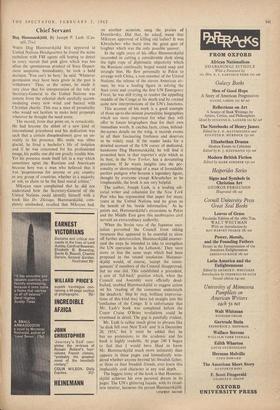Chief Servant
WHEN Dag Hammarskjold first appeared at United Nations Headquarters he found the scene turbulent with FBI agents still hoping to detect in every recruit that pink glow which was too often the spontaneous product of State Depart- ment suspicion. Immediately, he took a bold decision. 'You can't be here,' he said. 'Whatever permission may have been given in the past is withdrawn.' Thus, at the outset, he made it very clear that his interpretation of the role of Secretary-General to the United Nations was remote from the celestial clerk carefully accom- modating every new wind and hazard with Christian charity. This was a man of personality who would not hesitate to make bold proposals wherever he thought the need arose.
The record, from that point on, is remarkable. He had become the abbot of a new kind of international priesthood and his dedication was such that a certain diseinbodiment gave an un- reality to his presence. His smile was often glacial, he lived a bachelor's life of isolation and if he was concerned for his professional image, his public one did not greatly trouble him. Yet his presence made itself felt in a way which sometimes upset the Russians and Americans because here was a man who believed that it was 'preposterous for anyone or any country or any group of countries, whether in a majority or not, to claim to be the final moral arbiter.'
Mikoyan once complained that he did not understand how the Secretary-General of the United Nations could identify himself with a book like Dr. Zhivago. Hammarskjold, com- pletely unabashed, recalled that Mikoyan had, on another occasion, sung the praises of Dostoievsky. Did that, he asked; mean that Mikoyah approved of killing old ladies? It was Khrushchev who burst into the great gust of laughter which was the only possible answer.
In the eight years of his.office Hammarskjold succeeded in cutting a considerable dash along the tight rope of diplomatic objectivity which the Russians continually hoped would snap and strangle him. He flew personally to Pekin to arrange with China, a non-member of the United Nations, the release of the eleven American air- men, he was a leading figure in solving the Suez crisis and creating the first UN Emergency Force, he was still trying to resolve the appalling muddle of the Congo at his death and he created quite new interpretations of the UN's functions.
This account of his work is a good example
of those up-to-the-minute journalistic biographies which are more important for what they will offer to future biographers than for their own immediate worth. It catches facts, crises, behind- the-scenes details on the wing, it 'records events in all their fascinating freshness and deserves to be widely read. If the reader looks for a detailed account of the UN career of dedicated, handsome Dag Hammarskjold, he will find it presented here in that reporter's style which at its best, in the New Yorker, has a devastating precision. If he wants insights into the per- sonality or shortcomings of a man of formidable puritan pedigree who became a legendary figure, thought by everyone except Khrushchev to be irreplaceable, the book is not very helpful.
The author, Joseph Lash, is a leading edi-
torial writer and columnist for the New York Post who has represented that paper for many years at the United Nations and he gives us the benefit of his 'inside information.' As he points out, Hammarskjold's excursions to Pekin and the Middle East gave this unobtrusive civil servant an extraordinary authority.
'When the Soviet veto of the Japanese reso- lution prevented the Council from taking measures that appeared to be essential to stave off further deterioration, Hammarskjold enumer- ated the steps he intended to take to strengthen the UN operation in the Lebanon.' They were more or less the same steps which had been proposed in the vetoed resolution. Hammar- skjold would, of course, 'accept the conse- quences' if members of the Council disapproved, but no one did. This established a precedent, a sort of 'fall-back' position which, when the Council and Assembly were officially dead- locked, enabled Hammarskjold to suggest action on his 'reading of the consensus underneath the deadlock.' Step by step, brilliant improvisa- tions of this kind may have led straight into the confusion of the Congo. It is unfortunate that Mr. Lash's book was completed before the Conor Cruise O'Brien revelations could be examined in detail. The gap is painfully evident.
Mr. Lash is rather much given to phrases like
'as dusk fell over New York' and 'it is December 20, 1954,' but it must be added that he has no pretensions to the academic and his book is highly readable. At page 240 I began to feel that I would have liked to know Mr. Hammarskjold much more intimately than appears in these pages and immediately won- dered whether anyone beyond his Swedish father, or three or four Swedish friends, ever knew "this implacably cool character in any real depth.
The biggest irony of the book is that Hammar- skjold achieves his own personal dream in its pages. The UN's glittering facade, with its ritual- istic interior, becomes the person Hammarskjold.
VINCENT BROME


































 Previous page
Previous page